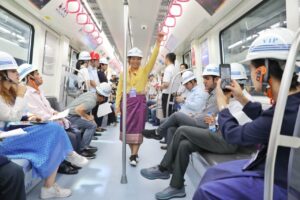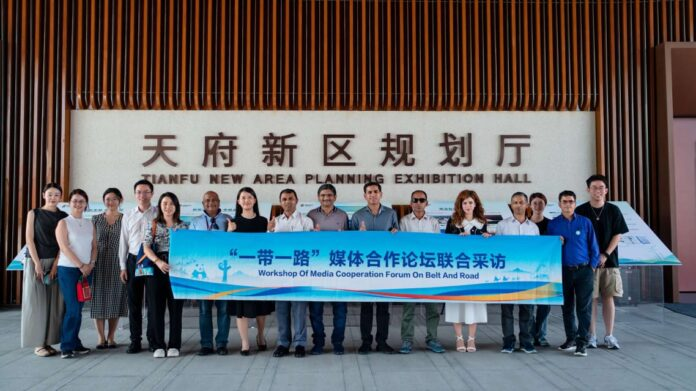A delegation of journalists from various countries, including Pakistan, recently visited several key infrastructure sites in Chengdu, China, with a particular focus on Chengdu Metro Line 30.
The visit provided a comprehensive overview of the city’s ambitious metro and light rail expansion plans, which are set to position Chengdu as a leader in modern urban transit.

The delegation was welcomed at the Chengdu Metro Line 30 Phase 1 Emergency Monitoring and Education & Training Center. Covering an area of 1,300 square meters, the center houses a safety experience hall, a rail science exhibition hall, an emergency monitoring center, an emergency supplies warehouse, and various training rooms.
Chengdu has been rapidly expanding its metro system, with over 600 kilometers of track already operational and more than 300 kilometers under construction. By 2025, the total length of Chengdu’s metro and light rail lines is expected to exceed 850 kilometers, and the city has set an ambitious goal to expand the system to 1,666 kilometers by 2035.
The Chengdu metro system, which began construction in 2005, has transported over 12.9 billion passengers to date. On peak days, the system handles more than 8 million passengers, and in July 2024, the average daily ridership reached 6.49 million. With a near-perfect punctuality rate and trains running as frequently as every two minutes during peak hours, the metro plays a vital role in Chengdu’s public transport network.
During the visit, the journalists were also briefed at the China Communications Construction Co. Ltd. (CCCC) site, where the delegation was shown the construction of Chengdu Metro Line 30.
This line, extending from Terminal 2 of Shuangliu Airport to Longquan Station, is the first in Western China to feature fully automated driverless trains, utilizing advanced communication technology between trains to increase capacity and safety. Construction on Line 30 began in 2020, with the line expected to be operational by the end of 2025.
The delegation also toured the Industrial Worker Safety Education Area, a 200-square-meter facility dedicated to promoting workplace safety. The center features 11 different zones, providing visitors with hands-on experiences, such as wearing safety helmets and practicing first aid techniques. The safety education center not only serves construction workers but also invites local schools and communities to enhance public safety awareness.
The visit included an introduction to the history and corporate culture of CCCC, which dates back to 1897. The company has grown into one of the world’s largest infrastructure firms, ranking 63rd on the Fortune Global 500 list in 2020. CCCC’s portfolio includes major international projects such as the Hong Kong-Zhuhai-Macau Bridge, one of the longest cross-sea bridges globally, and the Yangshan Port terminal in Shanghai, one of the world’s largest automated terminals. CCCC has also played a key role in China’s Belt and Road Initiative, contributing to the development of railway and port projects worldwide.
At the Rail Science Exhibition Hall, the delegation was provided with an in-depth overview of the entire metro construction process, from station building to track laying and equipment installation. The hall showcases the latest technological advancements in rail construction, such as tunnel excavation using shield machines and underground station construction.
Visitors were able to see models of key construction processes and explore the technological innovations being employed to ensure quality and safety at every stage of metro development.
The Emergency Monitoring Center for Chengdu Metro Line 30, which covers 140 square meters, was another highlight of the visit. The center is equipped with an intelligent construction site information monitoring system, enabling real-time video surveillance of construction activities. This system is integrated with tunnel monitoring technologies, allowing for immediate responses to any safety concerns. The center operates 24/7 with personnel on duty to ensure continuous safety oversight and emergency preparedness throughout the construction of Metro Line 30.
Chengdu’s metro expansion reflects the city’s commitment to developing a modern, efficient, and safe urban transport system. The visit by the international journalists highlighted the advanced technologies and safety measures being implemented, positioning Chengdu as a leader in the field of metro and light rail development.

